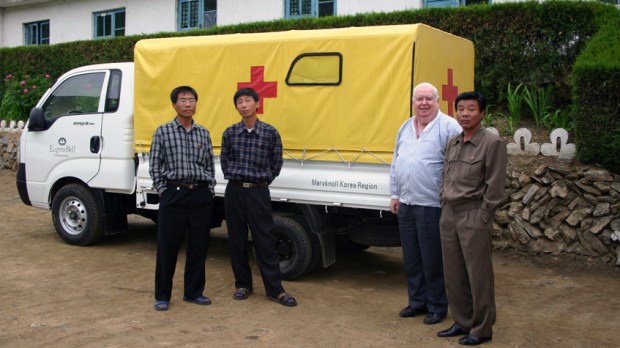In the fast-changing state of relations between the United States and North Korea over the past year—with Kim Jong Il going from being the biggest threat to North American security to his becoming a dialogue partner with the United States—a little known mission of mercy has continued to bring Catholic priests from South Korea across the border into the North.
The American priest spearheading that mission, Fr. Gerard E. Hammond, has served as a Maryknoll missionary in Seoul since 1960. That was only seven years after the end of hostilities in the Korean War, a war that, officially, at least, has never been declared over.
Fr. Hammond has been to the Democratic People’s Republic of Korea more than 50 times since the year 2000. He travels with a delegation from the Eugene Bell Foundation, a U.S.-based foundation that provides medical humanitarian assistance to rural North Korea. Along with a few other priests and others, he visits 12 multi-drug-resistant tuberculosis centers, where the patients are segregated from their towns and families.
For Fr. Hammond, a native of Philadelphia, it’s a bit of a pilgrimage: it was in the northern part of the peninsula that Maryknoll began its mission to Korea in 1923.
“There’s no freedom of religion at all in the North, really, so it’s amazing that they allow us to go there,” Fr. Hammond said during an interview at Knights of Columbus Supreme Convention in Baltimore, August 7. “When you think of it, I’m the enemy: I have an American passport, I’m an American priest in South Korea.”
The priests who accompany him are from other Western nations—Mexico, France, and Italy—and belong to other religious communities: Guadalupe Missioners, Oblates of Mary Immaculate, and the Paris Foreign Mission.
Fr. Hammond acknowledged that the government in Pyongyang built a Catholic church in the North’s capital in 1989, but said there are no resident priests there. “So, actually we don’t even know how many Catholics there are. It’s open two hours a week. I can’t hear their confessions. They have no groups meeting, like Legion of Mary, no weddings or funerals. So is it a real Catholic church?” Fr. Hammond said. “It’s a question mark.”
He said that Cardinal Andrew Yeom Soo-jung, archbishop of Seoul and apostolic administrator of the Pyongyang Diocese, has ordered any priests celebrating Mass there to not distribute the Eucharist, “because you don’t know who’s Catholic or not.”
But Fr. Hammond is grateful for being allowed the twice-annual trips to the North, which he calls “Healing Without Borders.”
“Not only the disease itself, [but] healing these wounded hearts,” he commented. “In the South we have 30,000 North Korean refugees, we have the separated families and all of this stuff. So there’s a lot of healing that has to be done.
“We want to be able to at least recognize the suffering of the people in North Korea, though we can never say anything much about politics or religion,” he said. “But the North Koreans know that we are priests. … They might not know what a priest is, because the last priests who were visible in North Korea is 70 years (ago) already.”
He said that many priests and religious in the North were imprisoned or executed just before the war began, on June 25, 1950.
“No one has ever heard from them again,” he said. “You would love to believe there are underground or silent Catholics. There might be a few, but as the years go by, they’d be very elderly.”
Commenting on the chain of events over the past year, he said, “Yes, we hope there’s a progressive way of having a dialogue, but the thing is, Is this really reality? Has [Kim Jong Un] really changed? That’s what’s on a lot of people’s minds. There’s a concern, but a great desire for the country to be united, somehow, but in the sense that there be religious freedom and so on. I say that by the end of this year, for sure, we should know which way things are going to go, if it’s really sincere, because step by step has to be taken somehow to fulfill what the president and Kim Jong Un said. It’s not that precise but only through meetings and conversation will things be evident whether he’s sincere or not.”
He said that when meeting with North Koreans, he finds common ground on three things: peace on the peninsula; reconciliation between the North and the South, and dialogue.
“They understand that, and I say that’s kind of the position of the Catholic Church, not only in Korea, but that’s the principle in the Vatican,” the 84-year-old priest said. “Of course we want peace, but will this really be true? What are the conditions for it? So perceiving them having some sort of dialogue, but it has to be mutual and open and respectful. And the North has to—as everybody agrees—somehow denuclearize.
“So it’s a challenge,” Fr. Hammond summed up, “but like the Holy Father said, we want to be there where there’s suffering, and where there’s suffering there’s Christ. So why shouldn’t we be there?”

